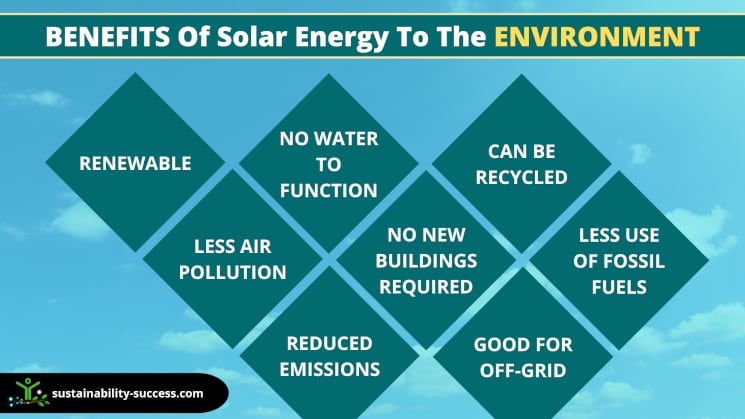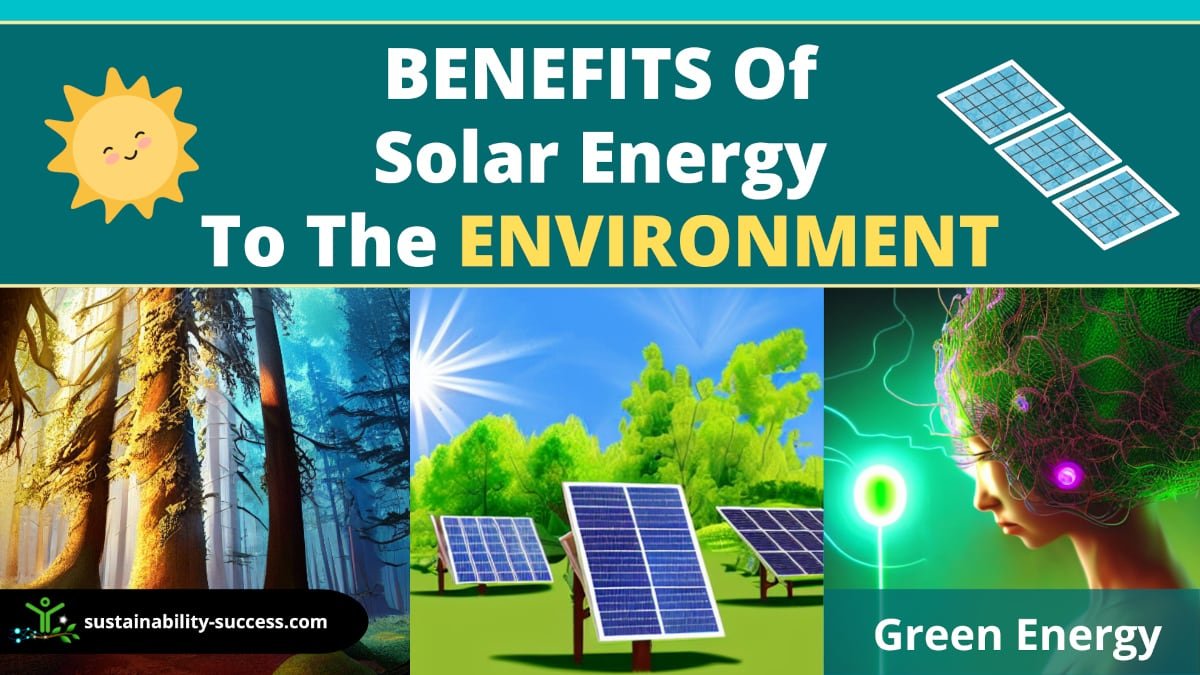Solar energy has been a source of clean, renewable power for many years. It’s also known for being a good source of electricity, but it’s not just about electricity. Solar energy can provide many benefits to the environment as well! But, what are the benefits of solar energy to the environment?
Benefits of solar energy to the environment
Here are 8 great benefits of solar panels to the environment!

1. Renewable energy source
Solar energy is a renewable source of energy, which means it can naturally regenerate itself and can be used over and over again with minimum environmental impact. This is clearly one of the greatest environmental benefits of solar energy.
The sun’s rays strike the earth’s surface and are absorbed by plants, animals, water, and solar panels as well. When solar panels absorb energy from the sun, they convert it to electricity or hot water (depending on the type of panel).
This clean energy is then stored in solar batteries and thanks to an solar inverter it can then be used straight away to power human activities later on.
2. Reduces air pollution
Why are solar panels good for the environment? Solar energy is a sustainable and clean source of energy that doesn’t produce harmful particulates in the air. So it reduces air pollution and makes our cities healthier places to live in.
Solar panels are usually located on rooftops or other areas that can capture sunlight all day long. Note that special attention needs to be taken when installing solar panels for sailboats, because those may be subject to shading and reduce the efficiency of the system.
This allows them to generate power every day without polluting the air for up to 30 years and with only minimal maintenance required!
3. Reduces greenhouse gas emissions
Solar energy can help to reduce the amount of greenhouse gases released by human activities in our atmosphere, which is a contributor to climate change.
Those gases include carbon dioxide, which is released when burning fossil fuels to generate energy.
4. It doesn’t consume water to function
One of the most under-appreciated benefits of solar energy to the environment is that it doesn’t require water to function. Unlike many other types of power sources, solar panels don’t need any external or internal fluids to function properly.
This means they don’t use up any precious water in order to operate and keep going.
Solar panels also don’t need to be cleaned with chemicals like those used by conventional fossil fuel plants. Instead, they rely on natural rain and evaporation for their cleaning process.
Solar panel cooling systems are similar: they use air cooling methods rather than relying on pumps connected directly to rivers or lakes.
These systems operate more efficiently than conventional ones because they take advantage of nature’s own natural processes rather than requiring human intervention!
Finally, and most importantly, solar technology doesn’t have any moving parts, so it doesn’t use any lubricant whatsoever!
5. It doesn’t require building additional infrastructure
One of the biggest solar energy environmental benefits is that it doesn’t necessarily require additional infrastructure. Solar panels can simply be installed on existing buildings and homes, which means there’s no need for new buildings to be built in order to accommodate the installation.
In addition, they’re easy to install: they don’t require digging up the ground or removing any trees or other vegetation around your home; all you need is a good amount of sunlight.
This means that solar energy can be installed without any additional environmental degradation caused by the construction of new infrastructure.
6. It can provide power to remote locations
Similarly, solar energy can provide power to remote locations without having to build costly and environmentally damaging infrastructure to connect to the grid.
If you have a cabin in the mountains or a vacation home and want to get some power from the sun, then solar panels could be a good option for you.
Solar panels don’t require any connection to the grid and thus reduce environmental impact when it comes to getting power into these areas. For example, you can use off-the-grid solar generator systems as well as RV solar panels to become completely self-reliant.
Moreover, solar energy can also be used to power solar yachts, allowing them to travel to remote locations with an unlimited range. This is because they use the power generated from the sun for their propulsion, so they don’t need to use fossil fuels. The maintenance of those solar catamarans will as well be lower compared to a standard boat.
7. Solar panels can be recycled
You may have heard that solar panels are made from a variety of materials, including silicon and silver. These materials can be recycled at the end of their useful life, that is about 30 years.
Solar panel recycling companies collect used solar cells which are made up of semiconductors and other parts. Then they send them to be reprocessed into new solar cells for use in new products like electronic devices or building insulation. This means that also solar panels can benefit from the advantages of recycling.
8. It reduces reliance on fossil fuels
The extraction of fossil fuels is a major contributor to human-induced climate change, as well as having many harmful side effects on the environment. Solar energy is renewable and cleaner than fossil fuels, which means it’s helping to reduce these issues.
In fact, once produced and installed, solar panels reduce your reliance on fossil fuels by generating electricity without burning anything at all! Solar panels can also be installed on sailboats and RVs reducing the reliance on generators and improving their environmental sustainability.
Even if the production of solar panels requires a lot of energy and materials, they don’t pollute the environment after their installation. Moreover, the pollution generated during the entire lifecycle of solar panels is significantly lower compared to fossil fuels.
Solar energy also has great potential for helping us live better lives while reducing our dependence on foreign oil supplies, and that’s something we can all agree with!
Solar energy is getting cheaper
Solar energy is also getting cheaper. The falling price of solar panels is a big factor, but there’s also a drop in installation and maintenance costs, too.
Production and installation prices are down because of the advancing technology. Some of those also make it easier to install panels on rooftops.
Maintenance costs will go down as well since fewer people need to be trained on how to maintain them.
Types of photovoltaic solar panels
There are many types of solar panels, including monocrystalline, polycrystalline, and thin film:
- Monocrystalline panels use a single crystal of silicon to absorb the sun’s energy.
- Polycrystalline solar cells are made up of multiple crystals that make production easier and help to reduce costs.
- Thin-film cells contain fewer layers than typical photovoltaic arrays; they’re also inexpensive because they don’t need as much material to produce electricity as other types do.
- Amorphous silicon (a-Si) is another alternative option that has recently become popular thanks to its high efficiency and low manufacturing costs compared with other types. It can even be printed onto plastic or metal surfaces like sheets or foil!
The most common types of solar panels are monocrystalline and polycrystalline. Those are available in the US from many manufacturers, such as Sunpower, Hanwha Q Cells, and others.
Also, one of the exciting green tech companies (Tesla) is making an interesting solar roof option to minimize the visual impact of solar installation.
Finally, it is important to know that the efficiency of your solar installation can be greatly affected (up to 30%) by the type of solar charge controller used in your setup.
Conclusion
Solar energy is one of great the examples of sustainable development and is an effective, affordable, and sustainable way to generate electricity and hot water.
The benefits of solar energy to the environment, are:
- Renewable energy source
- Reduces air pollution
- Reduces greenhouse gas emissions
- It doesn’t consume water to function
- It doesn’t require building additional infrastructure
- It can provide power to remote locations
- Solar panels can be recycled
- It reduces reliance on fossil fuels
Among those, the most important environmental advantages of solar energy are the reduction of air pollution and greenhouse gas emissions, which contribute to climate change.
In any case, if after considering the solar panels environmental benefits you decided to install them on your house or business, make sure to ask the right questions to the solar company before signing a contract!
Solar energy benefits also self-sustainability, because it can provide power to remote locations without building additional infrastructures such as transmission lines.
Solar energy delivers benefits to all the 3 pillars of sustainability (the 3 P’s or three Es of sustainable development):
- Environmental sustainability: see all of the above-mentioned benefits of solar energy to the environment.
- Social sustainability: new jobs created to manufacture, install and maintain solar energy installations.
- Economic sustainability: new opportunities for economic growth.
Solar panels are without a doubt one of the most exciting examples of environmental sustainability, as well as one of the examples of green technology that will change the world in the coming decade.
Moreover, considering the benefits of this green technology, solar energy is also one of the important sustainable business practices for companies. Those can also be installed when following through with the environmental responsibility commitments of eco friendly businesses around the world.
The technology behind solar panels has also improved significantly over the last few decades so now they are more efficient (up to about 22%) and much cheaper. So much so that now they can even work when is cloudy and outside of peak daylight hours.
Solar energy, thanks to its benefits to the environment, society, and the economy, will be a central player in the coming green revolution to achieve sustainability!

